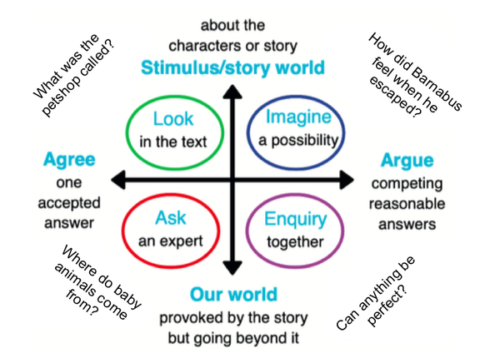I came across the book The Barnabus Project, by the Fan Brothers,at Woodford Valley Primary School last week. It follows Barnabus, half-mouse half-elephant, and his friends – all labelled failures by the scientists who run Perfect Pets. It’s a great story and contains themes to get children of all ages thinking. The video and session plan is below.
See You at the SAPERE Conference – Saturday 19th November?
There are just a few days left to get early bird tickets for the SAPERE Annual P4C Conference, celebrating 30 years of P4C in the UK. Hosted in Sheffield, it’s a chance to learn from a huge number of experts in P4C. We’ll be running a session with children on The Ethics of Farting, and Jason is hosting a discussion with Andy West about his marvellous memoir of philosophy, prisons and philosophy in prison, The Life Inside. Highly recommended! There’s also a screening of Young Plato, a moving film about a Belfast school’s adventures with philosophy for children, and a talk by its genuinely inspiring headmaster, Kevin McArevey.
The Barnabus Project
If you can’t buy the book, you can play this narrated video:
You can use the book to help children create their own philosophical questions, or you can create some in advance. A good tool for both is our variaton on Phil Cam’s “Question Quadrant”. Below, we talk you through how to use it for The Barnabus Project, but it can be used for any stimulus.

One way to help learners use it is to let them with as many questions as they can about the story, and then sort them into their correct boxes as a class.
The aim of the tool is to find juicy philosophical questions for the bottom-right box. It’s useful for distinguishing these kinds of questions from the others.
So how best to make them? Consider doing a concept pool – give groups a few minutes to think of five ideas/words/phrases that are important to the story and put them on mini-whiteboards or paper in the middle of your circle. This book might lead to ideas like freedom, perfection and failure. Encourage children to use these to create universal questions that could be answered by someone who hadn’t read the story. Providing question starters such as the 5 W’s, as well as “Is…”, “Does…”, “Should…”, and “Can…”, will also help.
The best questions will:
- contain a big idea
- divide opinion
- be provoked by the stimulus, but not be reliant on it
Of course, you can do all of this yourself in your own planning. Here’s a few we made together at Woodford Valley:
Freedom:
Are there different kinds of freedom?
Can you have too much freedom?
Do we all belong somewhere?
Perfection:
Why do people try to be perfect?
Can anything actually be perfect?
Can something perfect also be bad?
Failure:
What makes something a failure?
Who decides what a failure is?
The other three boxes certainly have worth. For younger children, you can use the tool yourself to make up your own comprehension questions (top-left), followed by imaginative questions (top-right) before going to the more general philosophical ones. These quadrants can also help us create questions for subjects like English, science and history.
Best wishes,
Tom and Jason
Sticky Question of the week:

P4C for every class, every week – learn more about Sticky Questions.
Never miss a resource! Get these P4C ideas sent straight to your inbox every week for free. Sign up here.